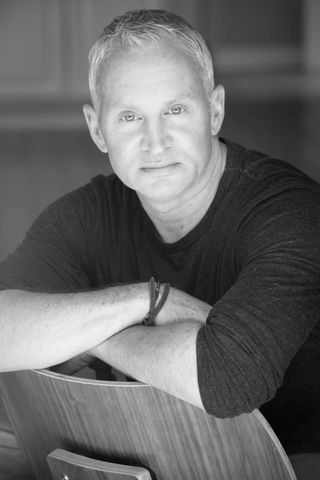Confidence
David Rocklin: Do Artists Need Community?
How one author found his tribe – and thrived.
Posted December 18, 2017
Contributed by David Rocklin, author of The Night Language

Writing is a lonely occupation.
Writing is lonely because we need it to be, to get to the places where the stories live.
Yet even as we isolate ourselves, we want others around us. Readers and audiences, clearly, and fellow writers to commiserate with until it’s time to go away again. We’re constantly living somewhere on this strange continuum, pushing the world away in order to create something good, then grabbing for the world again, trying to make it come back to us.
Maybe the wisdom about writing being a lonely occupation is incomplete. Maybe, writing is a lonely occupation because we make it that way until we need to unmake it.
I’ve always considered myself an outsider. I never fit anywhere that I could easily see growing up. It was why I ended my days writing in my journal. I didn’t know how to make sense of the world, let alone find place in it, without following words. If not to the end of my solitude, then at least to the saying of it – I’m alone. Writing out some version of those words allowed them to live, and the fact that they lived meant they weren’t forever and could one day die. I had no idea how, and never suspected that the writing I used to understand how I felt would be the instrument of changing how I felt.
I wrote my way into adulthood. I moved from the city I grew up in because it didn’t seem possible to write anything but “me” while still living in the place that shaped me. I didn’t know what sort of writer I wanted to be, only that I didn’t want to be the kind that only wrote and rewrote versions of my own story.
I tried and failed over and over. My first attempts at writing were mannerisms of other writers, not my own sensibilities. The first novel I completed was a 1,000-plus page horror opus with the Passover story as its jumping off point. (I wish I was kidding.) Stunningly, no agent reached out to deliver literary stardom. I know, right? Philistines.
No one likes rejection, but what I lacked in confidence, I made up for in relentlessness. Even poor efforts held palpable hope of getting better. The next novel was a thinly veiled account of me, written as much to get it out of my system as to get published. But it also marked an important first step: I took it to an advanced writing workshop, my first time among other writers.
I don’t have an MFA and I wasn’t part of any literary community. I didn’t know any other writers at all. Now I was in a room full of them, talking about our work, sharing excerpts and giving each other constructive criticism. Well, mostly; some of the writers seemed to relish taking others apart for everything from syntax to substance, while other writers seemed helpless to separate their self-worth from their sentences. There were tears, fights, a departure or two.
I loved it.
Sure, hearing critiques of my words challenged me, but I felt close to those people because they were trying to do what I was trying to do. Taking moments – mostly from their own lives, as was I at that time – and writing to make sense of them. No, more than that. Writing to relight those moments, so they’d illuminate the moment they were in now. We had something so elemental and hard and important in common. It took me a while to find my voice in there, but the notion that I might be a writer worth reading seemed less improbable.
While I didn’t find a long-lasting community of writers from that group, I did get a mentor, lifetime friend, and my first true connection to the notion of a lit family. She led the workshop, gave me honest and encouraging notes on my novel, and remains in touch with me to this day, cheering me on book by book even as I cheer her on. We’re peers now, and through her, I came to my agent, and to publication. Seven years intervened, though, between the workshop and the moment my work found a home. During that time I wrote alone, still. I wasn’t a published author. I felt I had no business seeking a community I didn’t possess the bona fides to join. I didn’t belong.
Then came my first novel, The Luminist.
The woman who formed the factual basis for the central character was an outsider to both her native British and adoptive Ceylonese cultures. She found, in the early age of photography, a vehicle for the transgressive need to hold a moment still and keep it eternal. She also fought for place among the completely male-dominated circles of art and science. Of course, I had to write about her when I came upon her work at the Getty in L.A. She reminded me of me.
The Luminist got me an agent and was sold for publication. The dream, happening. The subsequent book tour put me back in the company of writers for the first time since the workshop seven years before. Spending time at readings and events with writers gave me that sense of belonging again. It also taught me how thoroughly wrong I had been to feel like an outsider before I was published.
During my book tour, I found communities of published and unpublished writers, and they each had voices and stories that were diverse, rich, beautifully done, and worthy of being heard. They were extraordinary in their work and their generosity of inclusion. They were there for each other, and now me.
That’s where my reading series, Roar Shack, was born. I pushed myself past the idea that I wasn’t good enough to belong and reached out to L.A. writers about starting a series. Any hesitancy I felt was outweighed by a desire to give writers a place to put themselves out there and be greeted in return by a community of creative, supportive, soon-to-be friends.
Through the series (now in its 5th year!) I hold the door open the way a door was once held open for me. I try to foster a sense of community and belonging, because in the faces of writers who come to read or listen, I see that dawning realization that they’ve found a home.
Any doubt I still harbor about how far I’ve come is answered by my new novel, The Night Language. It tells the story of two young men thrown together by war. They’re both outsiders who find themselves in the court of Queen Victoria. There they experience belonging and love before the inexorable tide of prejudice threatening to pull them apart.
Where my first novel depicted characters seeking their place in the world for the first true time, my second novel tells the story of characters finding that home, and fighting for the right to exist within it. My own arc, traceable through two novels. Not what I intended or planned, but right there for me, and now readers, to see.
Writing has been a teacher for me, and it’s taught me this above all: Feeling like you don’t belong simply means you haven’t found where you belong yet. It’s not a conclusion. It’s an impetus, and as it turns out, life is never quite the same after you give yourself permission to belong.
David Rocklin is the author of The Luminist and The Night Language, and the founder/curator of Roar Shack, a monthly reading series in Los Angeles. He lives in LA with his wife, daughters and a 150 lb Great Dane who seriously needs to stay on his own bed. He’s currently at work on his next novel.




